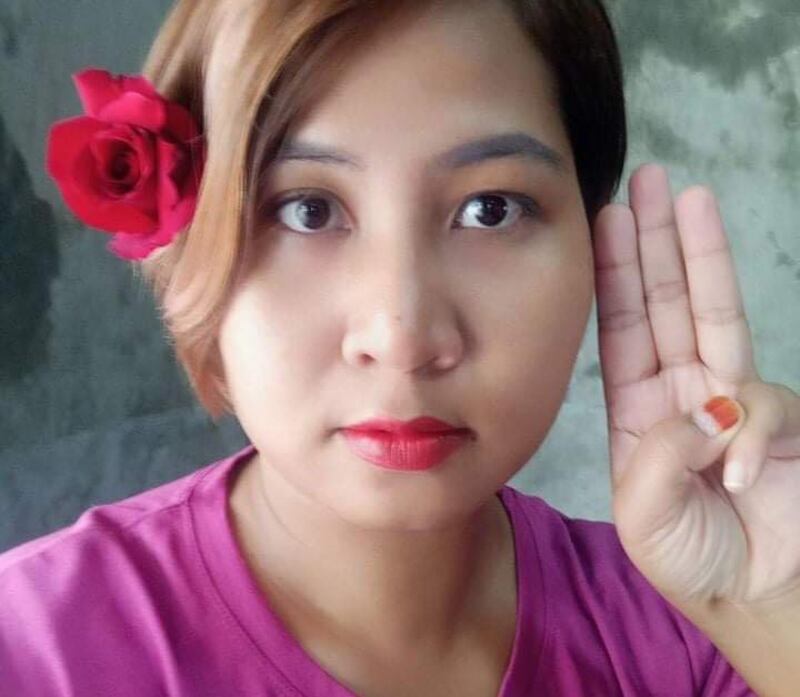She knew she was being sought by authorities for reporting on anti-junta protests.
In the seven months since the military had carried out a coup d’etat in February 2021, Myanmar had descended into chaos, Her husband, a former journalist, had been detained for four days before being released.
Fearing for her safety, Thuzar San decided to buy a bus ticket from Yangon for the Thai border town of Mae Sot, due to depart on Sept. 2, 2021.
But two days before she was to leave, she was arrested by police while her taxi was stopped at a traffic light by plain clothes police officers.
“We were asked to put our hands on our heads on the side of the road while they searched the car and then they handcuffed us, forced us to get into a truck at gunpoint, and blindfolded us,” she told Radio Free Asia.
Thuzar was one of the locally-hired reporters at RFA Burmese Service’s Yangon office from 2013-2014.
“There was another woman with us. When we arrived at the [interrogation] center, they said, ‘Let the lady exit first,’ so I asked if it was me they were talking about. All of a sudden, they slapped me in the face.”
During that first night, Thuzar’s interrogators subjected her to brutal mental and physical abuse in a bid to learn what she knew about the junta opposition and other journalists who had covered the protests.
“Four guys circled me and whipped me with a bundle of three [bamboo] canes bound together,” she said. “They asked me the names of the two young men I met during the protest. I was friends with them on Facebook, but I didn’t know much about them.”
Her captors beat her five times with a bamboo sapling that evening and said the wounds on her thighs took “more than a year” to heal.
“I will never forget the pain of being beaten with the bamboo sapling,” she said.
Ruthlessly whipped
Later, she was taken from her cell, blindfolded and led outside, where she was made to kneel on the pavement. Again, her captors beat her, demanding to know how she planned to travel to Thailand, which organizations she had ties to and which reporters planned to flee along with her.
“Three guys circled me and whipped me with canes – it was so painful,” she said. “This time, they pierced my flesh with the [sharpened] tip of the bamboo sapling and it was agonizing.”

When Thuzar told the men that she had nothing to divulge about her fellow reporters, they threatened to videotape her forced confession as “evidence” that she was a junta informant and hold her daughter hostage.
“They told me that they could make me talk and said, ‘We’ll bring in your daughter and beat her in front of you,” she said. “After that, I couldn’t stop crying. Finally, they sent me back to my cell.”
Over the course of several days, Thuzar was interrogated by several people.
On the ninth day of her detention, her captors took her fingerprints and sent a statement to the local police station, saying that she took part in anti-junta protests while covering the event as a reporter.
To Insein Prison
She was kept in police custody for nearly a month on charges of reporting fake news and inciting the public against the government. On Nov. 22, 2021, she was sentenced to two years in Yangon’s notorious Insein Prison with hard labor.
Thuzar described life at Insein Prison as a constant violation of her human rights.
“I stayed in Female Ward No. 9, which was like a hall with closed circuit cameras installed in it,” she said. “We had to change our clothes and use the toilet there [in front of the cameras]. The prison officials regularly scolded us and used harsh words. Our rights were severely violated.”
Thuzar was released as part of a general amnesty on Jan. 4, 2023, after spending 15 months in prison.
As she was no longer safe in Myanmar, she fled to Thailand along with her family in March.
While she feels unmoored as a refugee in a foreign country, Thuzar said she stays strong thinking about the sacrifices of those who have given their lives in opposition to junta rule.
She vowed to return to Myanmar as soon as possible so that she can join together with those fighting for democracy and a better future in her home country.
Translated by Htin Aung Kyaw. Edited by Joshua Lipes and Malcolm Foster.
